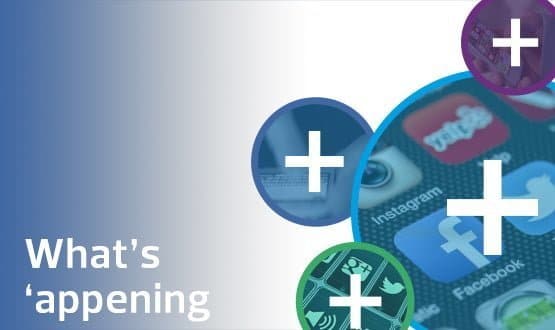Mobile health and apps news in brief

In this month’s mobile apps round-up we bring you news that Croydon Health Services NHS Trust has rolled out an app to its staff to improve communication in the hospital, plus AI-powered skin mapping technology that detects the signs of skin cancer is available to the public for the first time via an app.
Croydon Health Services Trust deploys new staff app
Croydon Health Services NHS Trust has rolled out an app from Ryalto, designed to improve the working and professional lives of its healthcare staff.
The trust is now offering all of its 3,800 workers access to Ryalto – a platform that enables healthcare professionals to manage their working day and acts as a safe and singular source of communication for all employees.
Traditional methods of communicating, such as newsletters and email, offer little insight and are proving dated in comparison to how people live their lives today, particularly on their mobiles.
Ryalto’s simple content management system gives communication teams a platform to disseminate news and information quickly, straight to staff’s phones. They are also able to send targeted messages, and critical announcements.
Matthew Kershaw, interim chief executive at the trust, said: “The app is reflective of how we live our lives today – on mobiles, with flexibility and in real-time. It offers a key digital channel for us to communicate with each other instantly, through the chat and news feed features, increasing opportunities for engagement and fostering a closer working environment where we work together to provide the best care for our patients.
“Staff at the Trust have responded really positively to the app, with over 1,000 signing up in the first month alone, and over 80 pieces of news, ranging from training opportunities to staff events and recognition, shared so far.
“We now have better access to analytics when it comes to our communication with staff, and are therefore able to make better, more measurable decisions.”
AI-powered app that detects skin cancer available to public
A skin mapping app has added AI technology which can detect one of the most common warning signs of melanoma.
Miiskin, the app that supports the British Skin Foundation’s work, has introduced the technology to help alert adults to new moles and marks on their skin. Research has shown lower public awareness that these could be a sign of cancer.
Developed in collaboration with the head of AI and medical computer imaging at the University of Copenhagen, the app allows patients to capture and track wide-area images of their back – a part of the body that one in three adults in Britain admits they do not check thoroughly.
Dr Anton Alexandroff, consultant dermatologist and British Skin Foundation spokesperson, said: “Patients often look for changes to existing moles but can be unaware they should also check for new moles or marks on their skin.
“With skin mapping technology historically associated with a clinical setting, it hasn’t previously been widely accessible for patients to use themselves.
“Bringing this kind of technology to patients can help raise awareness of the importance of regularly checking your own skin for changes and alerts adults to the potential significance of new moles or marks.”
New food order app could reduce hospital waste
WiFi SPARK, a leading provider of WiFi and technology solutions for hospitals, has announced a new partnership with catering software company Datasym.
By integrating Datasym’s technology with the provider’s SPARK Media platform, hospital patients can order meals using their own internet connected devices.
The combined solution effectively replaces the current pen and paper process of meal ordering, reduces food waste and provides significant cost savings to hospitals.
Hospitals that currently use pen and paper to collect meal orders face significant costs associated with printing forms and delivering and collecting them on hospital wards – a time-consuming process.
This approach is also open to mistakes as it would be easy for staff to mistakenly offer meal choices to patients who are nil by mouth or offer diabetic patients’ options that may be high in sugar. Existing menu scanning systems provide a basic technical step forward, but don’t take into consideration occasions when patients move beds, change wards or are discharged—their food is still delivered and goes uneaten.
The app also allows patients to view specific nutritional information for meals, helping to promote healthier choices. For example, embedded allergy settings will mean patients are only presented with food that meets their specific needs and won’t be able to select certain foods from the menu, avoiding confusion and additional health risks when in hospital.
Liverpool e-health firm exporting app innovation to Spain and Israel
Care Innovation, a Liverpool-based health sector innovator, is set to grow its turnover by 25% and create multiple new locally-based jobs this year, thanks to new project wins in Israel and Spain.
The company uses data and analytics to provide smart solutions for the health and social care sectors. These solutions can be used by care providers to help manage patients with long-term conditions like diabetes and chronic heart failure.
It also consults firms on how best to develop and commercialise new eHealth technologies. Its recent success in Israel and Spain will see the company provide consultancy on design and business development, with plans in place to roll out further in both countries.
Andrew Michaelson, managing director of Care Innovation, said: “The apps allow patients and healthcare workers to monitor patients and their conditions remotely and record them.
“For example, a healthcare worker can see and check the progress of a patient with diabetes while in another location. These apps are now being readied for use in use in Madrid and Andalucía and could soon be introduced to Catalonia and the Basque region.
“Thanks to the support from Department for International Trade, we’ve been able to identify new markets and understand how our products can work in these new markets.”
Care Innovation has a partnership with Tel Aviv-based Serenus AI, which has developed an artificial intelligence system that supports clinical decision-making by analysing more than 1.5 million patient records, international and local clinical guidance to recommend courses of treatment likely to produce the best patient outcomes and prevent unnecessary surgical procedures.




